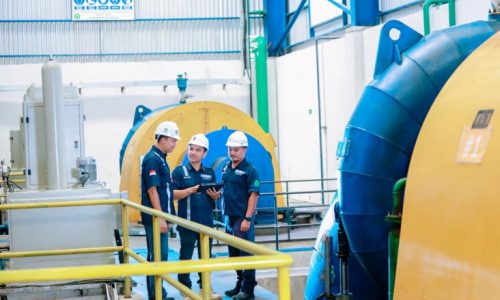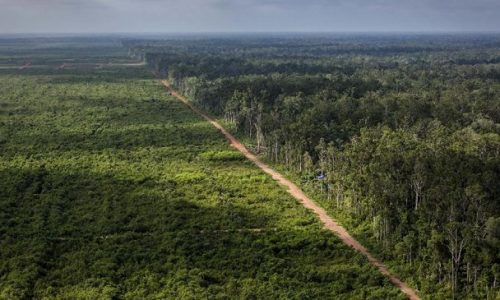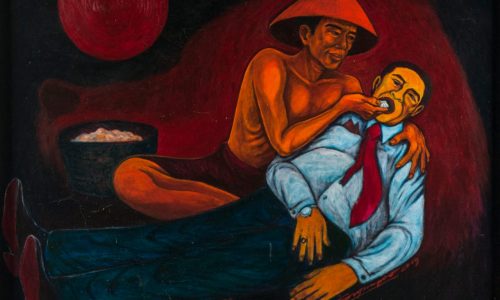Indonesia’s anti-terrorism squad Densus 88 arrested three people in Bekasi, West Java, on November 16, 2021, who are linked to the funding of Indonesia’s notoriously terrorist group Jamaah Islamiyah (JI).
In an interview with Indonesia Business Post, National Police spokesman Insp. Gen. Dedi Prasetyo named Ahmad Zain An Najah, Farid Ahmad Okbah and Anung al Hamat as three JI senior members arrested by the squad. The arrest was made possible due to information from JI Emir (highest leader) Para Wijayanto, who had been arrested on June 29, 2019.
Following the arrests, Densus 88 managed to gain information on JI’s funding and source of funds. An Najah and Okbah are members of the Baitul Maal Abdurrahman bin Auf Foundation, which is affiliated to JI. While al Hamat is an advisor to Perisai, an organization that provides legal assistance to members of JI imprisoned by Densus 88.
Fund raising targeting Muslim community
Densus 88 operational division head Sr. Comr. Aswin Siregar said JI established numerous institutions and organizations to raise funds from the Muslim community. Baitul Maal Abdurrahman bin Auf is one of the foundations. There was also Syam Organizer foundation.
“According to FS (chairman of Baitul Maal Abdurrahman bin Auf), such type of organizations collect funds and transfer them to the leadership of JI,” Siregar told a press conference in November 17, 2021.
The anti-terror squad investigation indicated that the Baitul Maal Abdurrahman bin Auf could raise fund between IDR14 and IDR15 billion annually. These figures came from the foundation’s financial statements.
According to Siregar, the amount collected by the foundation may be significantly higher because the foundation employed compartmented cells and did not keep formal records of their income.
“During a raid at the office of Syam Organizer, we confiscated a total of IDR944,858,500,” he said, adding that Densus 88 had arrested 24 individuals from Bauitul Maal Abdurrahman bin Auf and Syam Organizer.
The foundations conducted numerous public fundraising efforts, with many contributors likely unaware that they were financing a terrorist organization. Donations were collected through the establishment of charity boxes by several foundations. The police announced in December 2020 that Baitul Maal Abdurrahman bin Auf had distributed 20,068 boxes in 12 provinces. Foundations placed their charity boxes at small markets, restaurants, traditional markets and kiosks.
The collected funds were used to support JI projects. From the IDR15 billion raised by the foundation in 2019, around IDR480 million had been transferred to the JI treasurer as a deposit. A majority of the remaining funds were used to support legal activities for education, orphans’ food and sending aid to Syria, including clothes and food.
“Legal activities were part of the JI strategy to gain the public’s sympathy. In the end, they are seeking control over an area and support,” Siregar said, adding that if the police arrest them, the public would react strongly that they are being criminalized.
The money was also used for the construction of Sasana, a martial arts studio, and a workshop. The martial arts studio was also a training site for physical and self-defense training to increase the ability of cadres to deal with police officers. The workshop is where JI members assembled homemade firearms.
Other source of funds
In addition to collecting funds from the public, JI also raises funds through its internal organization. JI members must contribute 2.5% of their monthly income – just like zakat or an alms-giving as a financial obligation mandated by Allah, and one of the five pillars of Islam – to support the organization.
The Institute for Policy Analysis of Conflict (IPAC) indicates that Jamaah Islamiyah also received contributions from wealthy members and sympathizers.
“Although there are important differences between various extremist organizations, they have followed a similar model for using charities,” said Sidney Jones, IPAC Senior Adviser, in a report. “This involves identifying a concrete humanitarian need; giving it a religious justification; raising funds as broadly as possible; claiming transparency by periodically publishing accounts; and then diverting funds for jihad and support to arrested members.”
JI also operates its own business. Under the leadership of Para Wijayanto, JI aimed to establish and manage companies, such as plantations, food processing plants and electronics manufacturers, which profits would be used to carry out JI activities.









